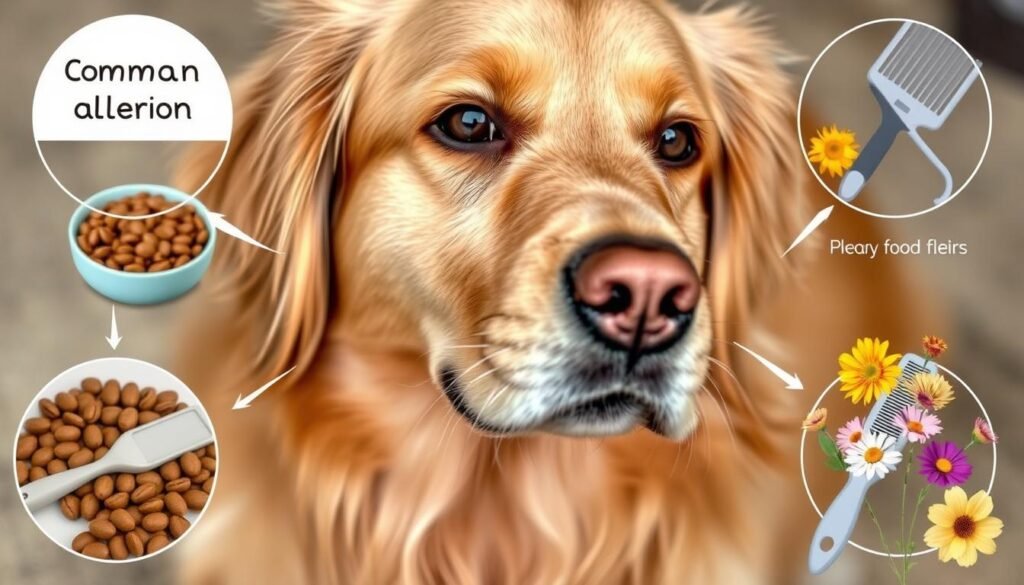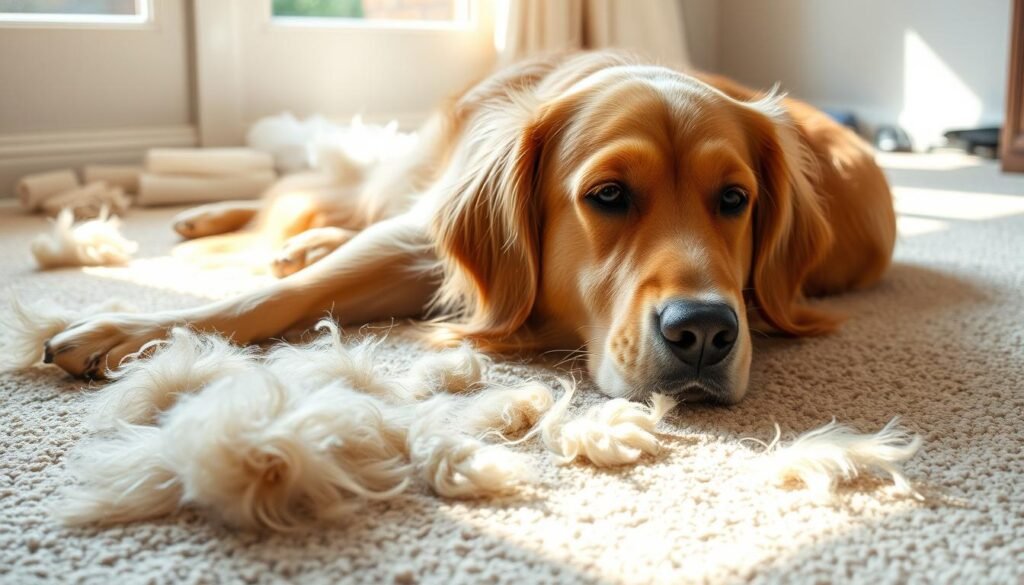Flea allergy dermatitis is the top skin issue in dogs, leading to significant hair loss. For Golden Retrievers, losing hair means more than looking less adorable; it can be a sign of health trouble. While it’s normal for dogs to shed, too much hair loss is a problem. It could point to allergies, hormone issues, or infections.
This guide helps Golden Retriever owners with treatment options for hair loss. It’s about keeping your dog looking good and feeling great. Regular vet visits are vital for catching health problems early. For more advice on treating golden retriever hair loss, check out this resource.
Key Takeaways
- Flea allergy dermatitis is a leading cause of skin issues and hair loss.
- Excessive shedding can be a symptom of hypothyroidism or other health conditions.
- Alopecia affects many breeds, including Golden Retrievers.
- Understanding the differences between normal shedding and hair loss is essential for pet owners.
- Regular veterinary checks are critical to identifying underlying medical issues.
- Effective treatment options include medications, dietary changes, and proper grooming techniques.
Understanding Golden Retriever Hair Loss
Golden retrievers losing their hair can worry owners. Knowing why it happens is key to handling it well. Dogs get alopecia, showing up as thin or bald spots, due to things like allergies, infections, or hormone issues. Spotting these causes is the first step to helping your furry friend stay healthy and happy.
What is Alopecia in Dogs?
Dogs with alopecia might have a little or a lot of hair missing. Allergies, especially from fleas, can cause hair to fall out quickly. Older dogs might get Cushing’s disease, leading to hair loss and other signs like drinking and eating more. Golden retrievers sometimes lose hair because of their genes or illnesses like hypothyroidism.
Differences Between Shedding and Hair Loss
Knowing the difference between shedding and hair loss helps you care for your pet. Shedding is when dogs naturally lose old fur, mostly in spring and fall. But, hair loss could mean a health issue, especially if there’s also itching or a bad smell. Skin infections might make shedding worse or cause bald areas. Regularly visiting the vet helps tell them apart and find the right treatment.
Common Causes of Golden Retriever Hair Loss
Knowing why Golden Retrievers lose hair helps owners solve these issues. Factors such as allergies, skin infections, and genes play a role. These problems can make this breed more likely to have skin and coat issues.
Allergies and Their Impact on Hair Loss
Many Golden Retrievers lose hair due to allergies. They might be allergic to food or things like pollen and dust. A single flea bite can severely damage their coat due to flea allergy dermatitis. Around half of the dogs with skin allergies lose hair, affecting their health and comfort. For details on allergies and hair loss, visit this resource.
Skin Infections and Infestations
Skin infections significantly cause hair loss in Golden Retrievers. Issues like bacterial infections, ringworm, and parasites lead to shedding. Over 40% of dogs with skin conditions lose hair. Also, many dogs with skin infections have allergies too, showing how related these health issues are.
Genetic Factors and Breed Predispositions
Genes are key in determining a dog’s risk of hair loss. Golden Retrievers are prone to conditions like hypothyroidism and Cushing’s disease due to their genetics. These diseases often cause hair loss. It’s vital to regularly check and diagnose these conditions early to keep your dog’s coat healthy.

Signs of Excessive Shedding in Golden Retrievers
Knowing when golden retrievers shed too much is key to their health. Keep an eye out, especially when they shed more in spring and fall. They have a double coat that sheds moderately all year, but it increases in those seasons.
Identifying Bald Spots on Golden Retrievers
Spotting bald spots means looking closely at their fur. Make sure to check:
- The ears
- The belly
- Behind the legs
If you see bald spots, it could mean too much shedding or health problems. See a vet if these spots come with other bad signs, like skin problems or big behavior changes.

Behavioral Changes Associated with Hair Loss
Dogs change how they act when they lose hair. They might scratch or lick a lot, especially where the hair is thin. If your dog seems sore in spots or acts differently, get them checked out. This could point to health issues causing too much shedding.
Diagnosing the Cause of Hair Loss
Finding out why golden retrievers are losing hair needs a vet’s close look. This careful check makes sure the best cure is found. Vets start by learning about the dog’s health and behavior over time. They also consider the dog’s living conditions, what it eats, and any recent changes. This helps in figuring out the reason for the hair loss in golden retrievers.
Veterinary Diagnosis Methods
There are many veterinary methods for hair loss. They help find what’s causing a dog’s hair loss. Tests often include:
- Blood tests to look for diseases like hypothyroidism or Cushing’s disease.
- Skin scrapes to find mites or infections.
- Biopsies to check the hair roots.
- Skin cultures to see if there are fungal infections.
- Smears to look for allergies or irritants.
These tests are key in finding out the cause of hair loss. They help vets make a plan to treat the dog. Getting help from a vet quickly is vital. It stops the problem from getting worse. Click here for more info on hair loss and how to deal with it.
Treatments for Golden Retriever Hair Loss
Golden retrievers may lose hair for several reasons. Understanding and acting on these causes is crucial. It helps improve their coat health and overall well-being significantly.
Medications for Allergies and Infections
Allergies and infections often cause hair loss in these dogs. Treatments like medications for allergies help. They include antihistamines and corticosteroids for environmental allergies. Antifungal and antibacterial meds are key for infection-caused hair loss, from bacteria or yeast. For herbal solutions, see natural remedies for hair loss.
Hormonal Treatment for Endocrine Disorders
Hormonal imbalances can also affect a retriever’s coat. Diseases like Cushing’s and hypothyroidism lead to hair loss. Hormonal treatments for dogs may include replacing hormones or regulating them with medication. Catching and treating these early helps prevent worse problems.
Managing Nutritional Factors for Skin Health
Diet is key for a healthy coat and skin. Proper nutritional management for dogs is essential to fight hair loss. A good diet has necessary fatty acids, vitamins, and minerals. Talking to a vet can guide dietary changes to boost skin health and overall energy in golden retrievers.

Best Supplements for Golden Retriever Shedding
Golden Retrievers need special supplements to manage their shedding. These supplements are vital for keeping their coat healthy and reducing hair loss.
Essential Fatty Acids and Their Benefits
Omegas, especially omega-3 and omega-6, are key for a healthy skin and coat. Not enough of these can cause dry and itchy skin. This makes shedding worse.
Supplements like fish oil and flaxseed oil are great choices. They help make the coat better. You’ll see positive changes in your dog’s coat in a few weeks with regular use.
Vitamins and Minerals to Support Coat Health
Vitamins are also crucial to stop too much shedding. Biotin is very important because not having enough can cause hair loss. Zinc helps keep the coat shiny and healthy.
There are many supplements out there. They mix essential vitamins and minerals, like B vitamins in brewer’s yeast, which help reduce shedding. Using a good supplement can really improve your dog’s coat, making it look fuller and healthier.
Golden Retriever Grooming for Hair Loss Prevention
It’s crucial to groom your Golden Retriever regularly to stop hair loss. Good grooming helps with their shedding and keeps their skin healthy. This is very important for these lovely dogs.
Effective Grooming Techniques
Here are some key grooming practices for preventing hair loss:
- Brushing: Brush their coat 2-3 times each week. During times of heavy shedding, brush them daily. This can cut down on shedding by up to 80%.
- Nail Trimming: Trim their nails every 2-4 weeks to avoid discomfort while walking. Long nails increase the chance of pain by 50%.
- Ear Cleaning: Check their ears weekly to dodge infections. Without good ear hygiene, there’s a 20% chance of infection.
- Bathing: Rinse their coat well during baths to get all the shampoo out. Their thick double coat makes this step crucial.
Choosing the Right Tools for Grooming
Using the right grooming tools is key for Golden Retrievers. Here are some tools you should have:
| Grooming Tool | Purpose |
|---|---|
| Slicker Brush | Removes loose fur and prevents matting. |
| De-shedding Tool | Focuses on the undercoat to lower shedding. |
| Undercoat Rake | Crucial for managing undercoat hair in double-coated breeds. |
| Nail Clipper | Stops the discomfort of long nails. |
By using these grooming techniques and the right tools, you can really help your Golden Retriever. A steady grooming routine makes sure your dog stays happy and healthy.
Top Tips for Controlling Golden Retriever Shedding
Managing shedding in Golden Retrievers is a constant task. But, the right strategies can make all the difference. It’s important to give them a balanced diet and consider environmental factors that cause shedding.
Maintaining a Balanced Diet
A well-balanced diet helps control shedding and keeps the coat healthy. High-quality food with lots of animal protein and vital nutrients is key. Adding omega-3 fatty acids, like those in fish oil, improves skin and coat condition. Also, make sure your dog gets enough water—it prevents brittle hair and dry skin.
Regular check-ups with the vet ensure your dog’s nutrition is on point. This can help solve excessive shedding problems.
Environmental Factors That Can Help Reduce Shedding
The environment affects how much your dog sheds. Keeping your home clean reduces the amount of fur you’ll see around. Use a powerful vacuum with a HEPA filter for the best clean. Tools like slicker brushes and undercoat rakes keep shedding under control.
Creating a stress-free space for your dog is also key. Stress makes shedding worse. So, include plenty of play and exercise in their routine to keep stress low.
| Tip | Description |
|---|---|
| Balanced Diet | Provide food rich in animal protein and essential fatty acids. |
| Hydration | Ensure adequate water intake to prevent dry skin and fur. |
| Regular Grooming | Brush daily during high-shedding seasons; use appropriate tools. |
| Cleaning Routine | Vacuum regularly, especially with a HEPA filter. |
| Stable Environment | Provide a comfortable space to reduce stress-related shedding. |
Conclusion
Golden retriever hair loss has many causes like allergies, skin problems, and hormonal issues. It’s vital for dog owners to watch for hair loss signs. They should get the right treatment for their golden retrievers. This might mean seeing a vet and changing the dog’s diet.
Also, dealing with shedding takes effort. This includes regular brushing, a good diet with plenty of Omega fatty acids, and understanding how the seasons affect shedding. Owners should brush their dogs often, especially when they shed a lot. This helps keep the house free of fur and allergens.
Keeping a golden retriever’s coat healthy is key. It makes them look good and strengthens the bond with their owner. A well-cared-for golden retriever is a joyful and healthy pet. With proper care, you can handle most hair loss issues well.